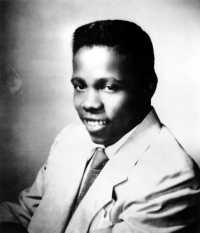Johnny Ace (June 9, 1929 – December 25, 1954), born John Marshall Alexander, Jr. in Memphis, Tennessee, was one of the stars of American rhythm and blues singing.Contents [hide] 1 Career 2 Death 3 Tributes 4 Discography 4.1 Singles 4.2 Albums 5 Notes and references 6 External links
[edit] Career
Alexander's father was a preacher in Tennessee. After serving in the navy during the Korean War, Alexander joined Adolph Duncan's Band as a pianist. He then joined the B. B. King band. Soon King departed for Los Angeles and Bobby Bland joined the army. Alexander took over vocal duties and renamed the band The Beale Streeters, also taking over King's WDIA radio show.
Becoming "Johnny Ace", he signed to Duke Records (originally a Memphis label associated with WDIA) in 1952. Urbane 'heart-ballad' "My Song," his first recording, topped the R&B charts for nine weeks in September.[1] ("My Song" was covered in 1968 by Aretha Franklin, on the flipside of "See Saw".)
Ace began heavy touring, often with Willa Mae "Big Mama" Thornton. In the next two years, he had eight hits in a row, including "Cross My Heart," "Please Forgive Me," "The Clock," "Yes, Baby," "Saving My Heart for You," and "Never Let Me Go."[2] In December, 1954 he was named the Most Programmed Artist Of 1954 after a national DJ poll organized by U.S. trade weekly Cash Box.[3]
Ace's recordings sold very well for those times. Early in 1955, Duke Records announced that the three 1954 Johnny Ace recordings, along with Thornton's "Hound Dog", had sold more than 1,750,000 records. [edit] Death
After touring for a year, Ace had been performing at the City Auditorium in Houston, Texas on Christmas 1954. During a break between sets, he was playing with a .22 cal revolver. Members of his band said he did this often, sometimes shooting at roadside signs from their car.
It was widely reported that Ace killed himself playing Russian roulette.[4][5] Big Mama Thornton's bass player Curtis Tillman, however, who witnessed the event, said, "I will tell you exactly what happened! Johnny Ace had been drinking and he had this little pistol he was waving around the table and someone said ‘Be careful with that thing…’ and he said ‘It’s okay! Gun’s not loaded…see?’ and pointed it at himself with a smile on his face and ‘Bang!’ – sad, sad thing. Big Mama ran outta that dressing room yelling ‘Johnny Ace just killed hisself!"[6]
Thornton said in a written statement (included in the book The Late Great Johnny Ace) that Ace had been playing with the gun, but not playing Russian roulette. According to Thornton, Ace pointed the gun at his girlfriend and another woman who were sitting nearby, but did not fire. He then pointed the gun toward himself. The gun went off, shooting him in the side of the head.
Ace's funeral was on January 2, 1955, at Memphis' Clayborn Temple AME church. It was attended by an estimated 5000 people.[7]
"Pledging My Love" became a posthumous R&B #1 hit for ten weeks beginning February 12, 1955. As Billboard bluntly put it, Ace's death "created one of the biggest demands for a record that has occurred since the death of Hank Williams just over two years ago." [8] His single sides were compiled and released as The Johnny Ace Memorial Album. [edit] Tributes
Elvis Presley covered Pledging My Love on his last studio session in 1976. Song appeared on Moody Blue album in 1977 at the time of his death.
Paul Simon wrote and performed the song "The Late Great Johnny Ace", in which a boy, upon hearing of the death of Ace, orders a photograph of the deceased singer, describing: "It came all the way from Texas / With a sad and simple face / And they signed it on the bottom / From the Late Great Johnny Ace."
David Allen Coe covered "Pledging My Love", introducing the song with his own recollections of hearing the news of Ace's death.
Johnny Ace is also named checked by Root Boy Slim in "House Band in Hell" as well as by Dash Rip Rock the song "Johnny Ace".[9]
Johnny Ace's song "Pledging My Love" appears in the 1973 Martin Scorsese film "Mean Streets."
The Fontane Sister's song "Eddie My Love" was originally titled "Johnny My Love" and was written in Johnny's memory. [edit] Discography [edit] Singles
Original singles issued by Duke Records "My Song" / "Follow the Rule" (1952) "Cross My Heart" / "Angel" (1953) "The Clock" / "Aces Wild" (1953) "Midnight Hours Journey" / "Trouble and Me" (1954) "Saving My Love For You" / "Yes, Baby" (duet with Willie Mae "Big Mama" Thornton) (1954) "Please Forgive Me" / "You've Been Gone So Long" (1954) "Never Let Me Go" / "Burley Cutie" [Instrumental] (1954) "Pledging My Love" / "Anymore" (on 78rpm) / "No Money" (on 45rpm) (1955) #1 on U.S. R&B Chart for 10 weeks, peaked at #17 on U.S. Pop Chart "Anymore" / "How Can You Be So Mean" (1955) "So Lonely" / "I'm So Crazy, Baby" (1956) "Don't You Know" / "I Still Love You So" (1956) [edit] Albums
Studio albums and compilations containing only/mostly Johnny Ace material Johnny Ace Memorial Album Duke (1955) Johnny Ace: Pledging My Love Universal Special Products (1986) Johnny Ace: The Complete Duke Recordings Geffen (2004) Blues & Rhythm Series: The Chronological Johnny Ace 1951-1954 Classics (2005) Johnny Ace: Essential Masters Burning Fire (digital download) (2008)
